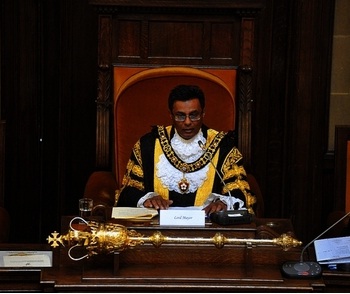
London, May 19: Indian-origin councillor Abdul Razak Osman has become the first Lord Mayor of the Islamic faith to hold the high office in the multi-cultural town of Leicester, which has a large minority of Indian origin people. Osman was born in Kenya and arrived in the UK in 1971. His late father Yousuf Razak worked on the East African Railway, and worked for a local engineering firm after moving to Leicester.
The Lord Mayor is Leicester's first citizen and has a high profile role maintaining and promoting the interests of the city and its citizens , by attending a variety of civic engagements during the year. Leicester previously had Hindu and Sikh Lord Mayors, but Osman is the first Muslim to hold the high office. Incidentally, the office of the Deputy Lord Mayor of Leicester is also held by an Indian-origin councillor, Mustafa Kamal, who hails from Ferozepur, Punjab.
Osman has worked with several charity organizations and was instrumental in fundraising to build two villages and a school in Kutch, Gujarat for orphaned children, following an earthquake in 2011.
PIO elected to city council in Texas
After several months of consistent campaigning, Indian-American Himesh Gandhi has been elected to a city council in the US state of Texas. Gandhi, 35, elected to an 'At Large' seat on the the Sugar Land City Council, received 2,468 votes (52.11%).






Comments
Add new comment